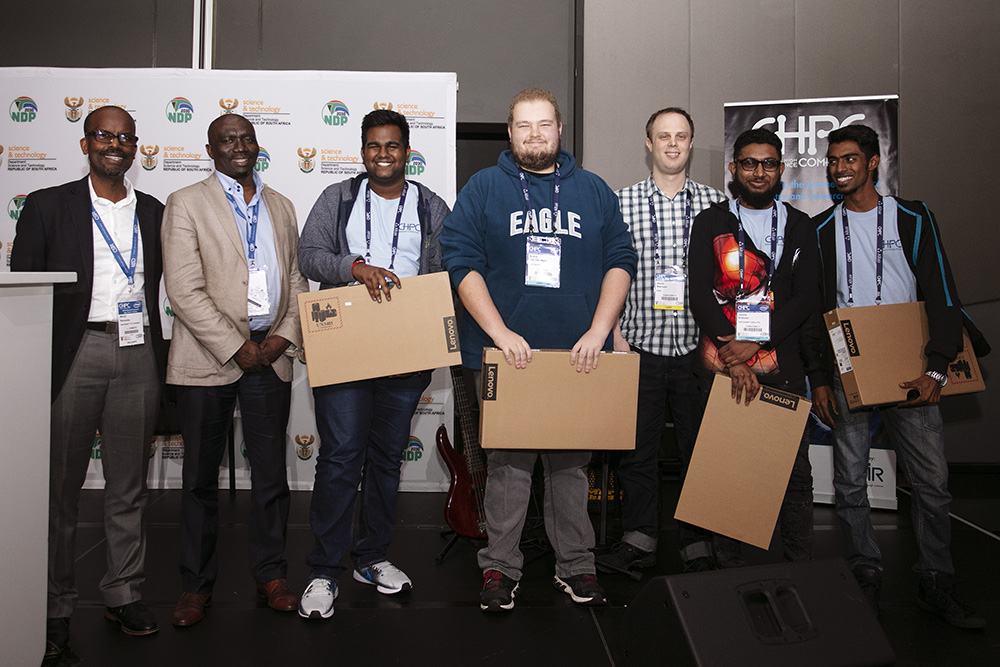Students to fly SA flag high at supercomputing competition in Germany
The annual CHPC conference, which took place in Cape Town recently, provided a platform for South African students to showcase their skills in building supercomputers and their innovative ideas on how to prevent cybercrimes through the Student Cluster Competition, and the Student Cyber-Security challenge.
This year, following the theme of the conference on how High Performance Computing (HPC) transforms for the future, growing of women participation in HPC was prominent. This was supported by the introduction of a sponsorship for an outstanding woman in the Student Cluster Challenge.
The annual Centre for High Performance Computing (CHPC) conference, which took place in Cape Town recently, provided a platform for South African students to showcase their skills in building supercomputers and their innovative ideas on how to prevent cybercrimes through the Student Cluster Competition, and the Student Cyber-Security challenge.
This year, following the theme of the conference on how High Performance Computing (HPC) transforms for the future, growing of women participation in HPC was prominent. This was supported by the introduction of a sponsorship for an outstanding woman in the Student Cluster Challenge.
The award in this newly introduced category, sponsored by Intel, was taken by Ms Mapule Madzena, a student from the University of the Free State. She was hailed as the best female student who participated in the competition and walked away with R64 500.
Six students from the University of Cape Town (UCT) and the University of the Witwatersrand (Wits University), who came out tops at a national student cluster competition to build a supercomputer, will fly the South African flag high at the International Student Cluster competition in Germany, in June next year.
During the competition, 10 teams of students from various universities in the country battled it out to build small high performance computing clusters on the exhibition floor – using hardware provided by CHPC and its industrial partners – and race to demonstrate the best performance across a series of benchmarks and applications.
Sefan Schroder, Dilon Heald, Jehan Singh and Clara Staasen from UCT; Anita de Mello Koch and Kaamilah Desai from Wits University, will test their skills against their international counterparts’ when they compete with computer students from 11 countries, including China, Germany, Poland, Singapore and Thailand, among others.
In the cybersecurity challenge, the University of Pretoria came first, followed by Stellenbosch University. This competition provides a platform for students to compete in real-time and come up with ideas that could protect South Africa from cybercrimes. The winning team will compete at an appropriate international competition, such as the European Cyber Security Challenge.
The CHPC is a Department of Science and Technology (DST) initiative managed by the Council for Scientific and Industrial Research (CSIR).
Speaking at the conference, DST Chief Director: Emerging Research Areas and Infrastructure, Dr Daniel Adams, said that the event was critical to develop the skills needed in the country.
“The DST remains committed to supporting skills development and new interventions. The CHPC is a great platform to stimulate the pipeline and boost human capital development. Initiatives such as these have led to slow, but steady, improvement in the enrolment of doctoral degrees,” he said.
CHPC Director, Dr Happy Sithole was impressed with the calibre of student who participated in the competitions. “I am very proud of the kind of innovation displayed by the students. I believe that they will represent us well at international stages. These competitions are critical to equip the future generation with cyberinfrastructure, supercomputing experience and expose science, technology, engineering, mathematics and innovation students to an array of opportunities”.
Over the years, South Africa has performed well at the International Student Cluster competition, wining it in 2013, 2014 and 2016, while came second in 2015 and 2017. In June this year, the team came third, after two teams from China at the cluster challenge in Frankfurt, Germany.
Dr Sithole was also pleased with the progress made in building a strong high performance computing community in the country.
“This year, our focus was on the transformation of both the use and development of cyberinfrastructure, which will help the industries, academics and the nations from across the continent. Looking back at the first meeting where we engaged in the discussions of building a strong high performance computing community in South Africa, and advocating for financial support from government, significant growth has been achieved. Notably, it is now a continental focus, not only on computing, but overall cyberinfrastructure growth and demonstration of impact.
Held under the theme “Transforming the Future through High Performance Computing and Transforming High Performance Computing for the Future”, the conference attracted over 400 people from business, industry and academia.

ENDS
Enquires:
David Mandaha: CSIR Media Manager
Tel: 012 841 3654
Mobile: 072 126 8910
E-mail:dmandaha@csir.co.za
Or
Nox Moyake: CHPC Communication Manager
Tel: 021 658 3987
Mobile: 072 026 6762
E-mail: NMoyake@csir.co.za
Or
Veronica Mohapeloa: DST Media Liaison Officer
Mobile: 083 400 5750
E-mail: veronica.mohapeloa@dst.gov.za

